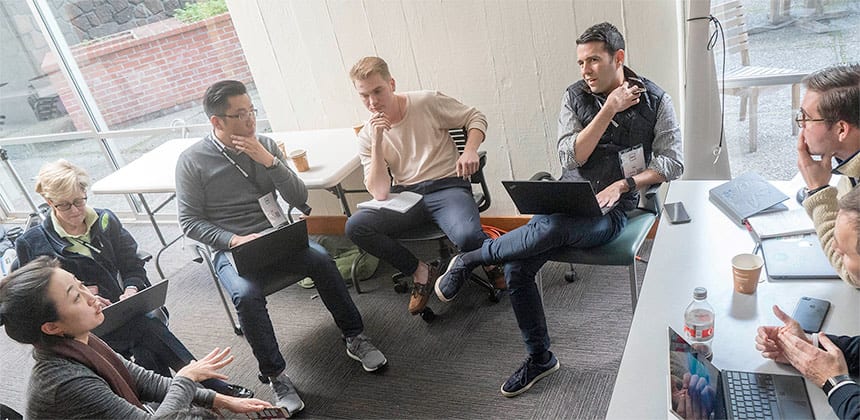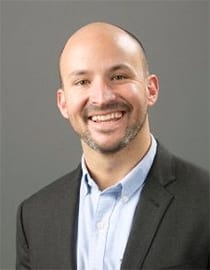
By Gwyneth K. Shaw
As the heart of the technology industry continues to move north and east, from the storied Silicon Valley to San Francisco and the East Bay, Berkeley Law has become a leader in teaching the intricacies of venture capital law and finance.

“I’d say we’re number one for venture capital, and I don’t think it’s close,” says Adam Sterling, executive director of the Berkeley Center for Law and Business (BCLB). “Berkeley Law is educating the world of venture capital. We’re democratizing access by providing this educational platform to aspiring lawyers, to practicing lawyers, and to entrepreneurs.”
That world includes law students, entrepreneurs, lawyers, and investors. Berkeley Law has more than a dozen VC-related courses—taught by core faculty and a stable of high-profile industry experts—as well as multiple programs for outsiders. The school’s reach extends into top law firms and tech companies, and around the world, through an online program that’s available internationally.
Professor Robert Bartlett says five years ago, there was a clear need for courses and programs that targeted the often opaque world of VC financing. Other law schools had a course here and there and some faculty doing research, but nothing more robust than that.
“From my window, I can literally see the South of Market District in San Francisco, which is now the major hub for VC activity,” says Bartlett, faculty co-director of BCLB and a founder and faculty director of Startup@BerkeleyLaw, “Given all of the expertise we have on campus on entrepreneurship, we thought there’s no reason why Berkeley shouldn’t become the go-to place for students looking to be leaders in this field. That was the a-ha moment, that we could exploit all the advantages we have.
“VC is the marriage of innovation and finance. We launched Startup@BerkeleyLaw to acknowledge that.”

Bartlett, who represented VC funds and emerging growth companies before moving into academia, teaches the core venture capital finance course. Fellow BCLB Faculty Co-Director and Professor Steven Davidoff Solomon teaches a mergers and acquisitions course.
VIP in VC
Many of the other VC-oriented offerings are taught by top practitioners, including Scott Kupor, managing partner of Andreesen Horowitz; Susan Biglieri, CFO of Kleiner Perkins; and Paul Clark ‘80, managing partner of the Washington, D.C., office of Seward & Kissel.
“We tried to design a program that relied on in-house expertise but also exploited our networks,” Bartlett says. “For students who want to be a VC lawyer and are taking these classes, they’re literally getting the training they would get as an associate at a firm specializing in VC finance. They’re able to hit the ground running at a level they can’t get anywhere else.
“There’s just no law school that has the offerings we have.”
Berkeley Law students can join the Startup Law Initiative (SLI), one of the school’s 30-plus Student-Initiated Legal Services Projects, and provide free incorporation services to local entrepreneurs with supervision. Additionally, students can deliver broader legal services to community-focused businesses through the New Business Community Law Clinic.
Then there’s the focus on outreach to the VC community. FORM+FUND, which runs twice a year, is a series of seminars aimed at teaching entrepreneurs what they need to know to start and scale a business from a legal, financial, and organizational standpoint. It’s a free certificate program open to Berkeley students, staff, faculty, and alumni; the next application deadline is Jan. 31. It dovetails with Access to Entrepreneurship, a partnership with VC firms to help broaden the pool of startup founders.

“It’s important as a public institution that we’re trying to do what we can to solve some of the diversity problems in the VC and tech sectors,” says Deborah Kang, director of Startup@BerkeleyLaw. Kang, a former Silicon Valley IP attorney, was hired to lead the initiative in 2017.
The school also runs three executive education programs for aspiring venture capitalists and practitioners looking to get into the industry. VC Deal Camp is a four-day course, held on campus, to teach the nuts and bolts of VC financing and deal-making. The application deadline for the upcoming Feb. 10-13 session is Jan. 24.
VC University, a partnership with the National Venture Capital Association, offers an online certificate course as well as satellite courses on other campuses. In 2019, the program was made available at the University of Michigan and Tulane University; this year’s locations should be announced soon.
Expanding access
“Part of the diversity problem that we see is also a geographic one,” Bartlett says. “These programs allow entrepreneurs from outside the big centers of the industry to have this important knowledge too.”
Across the spectrum of courses, the mission is to teach the basics, including finance, corporate governance, intellectual property, fintech, financial modeling, and more. It’s a specialized skill set, Bartlett says, that can be intimidating to the uninitiated.
“What makes the venture capital ecosystem so special is the actual legal technology, the way you do transactions,” he says. “It’s very systematized and there are lots of efficiencies in it, but it’s very opaque. It’s not at all accessible to people who are trying to come at it fresh.”
Bartlett compared Berkeley Law’s offerings to a three-legged stool: student training, community outreach, and research. All are important as the VC sector continues to grow.
Sterling uses himself as an example: He got his MBA at Berkeley, but still didn’t have some of the tools he needed to launch a successful startup. Berkeley Law’s programs are filling those gaps with important, relevant, and high-quality information.
Donna Petkanics ‘85, a partner in the Palo Alto office of Wilson Sonsini Goodrich & Rosati—the founding sponsor of Startup@Berkeley Law—says it’s important to give students the kind of experience they need to serve their future clients.
“We are happy to see Berkeley Law fostering entrepreneurship through its venture capital-related programs, which are helping students learn the practicalities of incorporating and advising startups so that they have the proper foundation for success,” she says. “Wilson Sonsini attorneys have enjoyed mentoring law students who are working with startups and helping them to get formed.”
Everyone who comes out of Berkeley Law has a leg up in the tech community, says Josh Ephraim ‘17, now an associate in the Silicon Valley office of Gunderson Dettmer Stough Villeneuve Franklin & Hachigian. Other local assets, including the Haas School of Business, SkyDeck, and The House Fund, are just steps away from the law school, too.
“The VC curriculum at Berkeley is unmatched. Professor Bartlett is the only tenured faculty member at any top school that actually practiced in the space, and I think that his and Adam Sterling’s industry experience is reflected in their leadership across the program,” Ephraim says. “Paired with the access to the best VCs, entrepreneurs, and the attorneys that advise them, it’s unparalleled.”